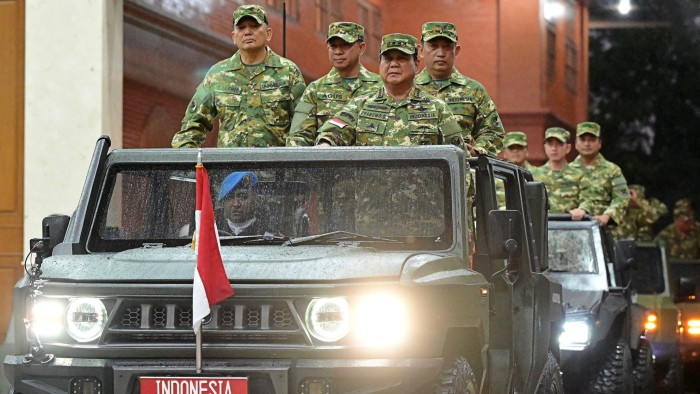Days after he was sworn in as Indonesia’s president, Prabowo Subianto took more than 100 senior officials of his new government to the national military academy, where they marched on a parade ground in fatigues and combat boots and slept in tents.
“I do not mean to make you militaristic,” the former general told attendees during the three-day retreat, which he said showed “the military way” to inculcate discipline and loyalty.
Six months into Prabowo’s presidency, his administration is doing many things “the military way”.
Prabowo has swiftly expanded the military’s role in Indonesia’s government, pushing a law allowing active-duty soldiers to hold bigger roles in government and roping in the armed forces to help implement his flagship free meals programme.
Under his direction, the military is also expanding the number of regional command centres, increasing its presence across the country down to the village level.
The army’s growing authority over civilian life has raised alarms in Indonesia, which was ruled not long ago by the Suharto military dictatorship.
Under Suharto, who was once Prabowo’s father-in-law, the army played a critical role in politics, public service and business. This system, known as dwifungsi, or dual function, was only abolished after Suharto’s downfall in 1998.
“The increasing involvement of the military in the civilian sphere shows that the ideas of reform are slowly being abandoned,” said Made Supriatma, a visiting fellow at Singapore’s Iseas-Yusof Ishak Institute.
“These plans will not only return the military to the New Order era but will also redefine civil-military relations,” said Made, referring to Suharto’s autocratic regime. “The military will return as a political force without declaring that they are a political force.”
The military’s creeping influence also comes as slowing growth threatens to undercut Indonesia’s appeal to investors as an emerging economic powerhouse. The growing military influence could also add to investor unease.
Last week, Indonesia’s parliament unanimously passed an amendment to a 2004 military law — rushed through with little public debate — that allows active soldiers to hold positions in 14 government bodies, including the attorney general’s office, up from 10 previously.
Early drafts of the amendment even proposed giving the president discretionary power to install military personnel in any government position, an addition that has since been shelved.
Prabowo’s government has repeatedly denied that the amendment indicated a return to dwifungsi, with army chief Maruli Simanjuntak dismissing such fears as “the thinking of simpletons”.
Defence minister Sjafrie Sjamsoeddin, a former three-star army general, said the amendment was needed “to face conventional and non-conventional conflicts”.
Prabowo violated the 2004 law even before the revisions went into effect, appointing two active soldiers to senior roles, including one as his cabinet secretary.
The amendments offered a way to “legitimise” these appointments, said one politician who did not wish to be named, fearing government reprisals. He said early drafts, since scrapped, clearly showed the government’s intention to install the military in politics.
“This way of thinking will surely destroy democracy . . . and will eventually lead to authoritarianism,” he said.
While reforms were introduced after Suharto’s bloody rule to keep the military out of politics, retired officers have played an influential role in Indonesian public life.
The country’s first direct presidential election in 2004 was won by Susilo Bambang Yudhoyono, a retired army general. Joko Widodo, Yudhoyono’s successor, appointed several former soldiers to his government, including a retired four-star general, as well as some active soldiers in contravention of the 2004 law.
But Prabowo, who once led Indonesia’s special forces, has gone even further, said Dewi Fortuna Anwar, research professor at the National Research and Innovation Agency of Indonesia.
“The normalisation of the military in civil service is not in line with good democratic governance,” she said, warning that the “securitisation” of government bodies was a slippery slope.

As defence minister under Widodo, Prabowo instructed the military to increase the number of provincial commands from 15 to 37, a move that is also expected to increase the number of territorial commands down to the village level.
The military is also providing logistical support for Prabowo’s landmark free lunch programme of feeding 82mn schoolchildren and pregnant mothers daily, and his government has announced plans for 100 “territorial development battalions” to help local communities achieve food self-sufficiency, a major priority for Prabowo.
“It is clear that the military will be very influential at the community level through control over the agricultural economy,” said Iseas’s Made.
Greater military involvement in civilian affairs could also raise the risks of violence and human rights violations, warned Hussein Ahmad from rights group Imparsial. Oversight “would be impossible as the military controls themselves”, he said.
Anwar, who as a senior government official was involved in the post-Suharto reforms, accused parliament, where Prabowo’s alliance controls a three-fourths majority, of acting as “cheerleaders” for the government, rather than exercising a check on its power.
But public outcry is growing. Pro-democracy activists and students held protests in Jakarta and other cities last week, calling on the government to scrap the revisions.
Investors are also worried, with Japanese investment bank Nomura on Tuesday citing concerns about active military personnel sitting on the boards of state-owned enterprises.
The moves have even drawn criticism from former president Yudhoyono, who backed the post-Suharto reforms. “Do not let [the military] repeat the past that has been corrected by history,” he said.
Read the full article here




